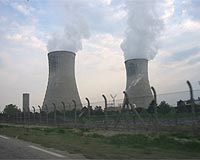 |
Riyadh, Saudi Arabia (UPI) Mar 24, 2011 Saudi Arabia is increasingly focusing on nuclear and solar energy because within two decades it will be using most of its oil production for domestic purposes, leaving little for export, if consumption keeps rising the way it is now. Hashim Yamani, president of the King Abdallah City for Atomic and Renewable Energy, recently said the kingdom, one of the world's leading oil suppliers, will require 8 million barrels per day by 2028 -- that's roughly its current production level -- just to meet domestic needs. The Saudis, along with several other Arab states in the Persian Gulf, has embarked on a controversial nuclear program to meet electricity demand that's rising at about 8 percent a year. Desalination requirements are growing by around 8 percent annually. Despite their vast hydrocarbon reserves, virtually all of the Arab states face natural gas shortages as their populations grow, economies expand and energy consumption mounts. Oil producers are burning up reserves simply to keep pace with power demand. In Saudi Arabia, this is expected to triple to 121,000 megawatts by 2032, according to figures released by the Riyadh government. The King Abdallah Atomic City was set up to develop nuclear technology as part of an $80 billion drive to boost power generation over the next decade, thus allowing the kingdom to maintain significant oil exports. Riyadh received bids from U.S. and British engineering companies in October for a pre-feasibility study of its planned nuclear program. It would identify sites for nuclear plants and study the diplomatic implications of building them. The U.S. Shaw Group and Japan's Toshiba Group announced last summer they had formed a partnership to pursue nuclear power projects in the kingdom. The Saudi government agreed July 5 to sign a nuclear cooperation pact with France "for the development of peaceful uses of nuclear energy." No details of the accord have been released and there was no indication when a formal agreement would be signed but it is likely to be soon because the Saudis are working against the clock. According to confidential U.S. State Department cables released by WikiLeaks, the U.S. Embassy in Riyadh warned Washington in 2007-09 about Saudi Arabia's production problems. One said that mounting demand for electricity in the kingdom was likely to constrain Saudi oil exports. "Demand (for electricity) is expected to grow 10 percent a year over the next decade as a result of population and economic growth," it said. "As a result, it will need to double its generation capacity to 68,000 megawatts in 2018." These cables spelled out that the crisis centered on doubts that Saudi Arabia would be able to pump more oil to keep prices stable if global supply was threatened -- as it may wind up being because of the political whirlwind sweeping across the Arab world. The cables from the Riyadh embassy said that a former head of exploration at the state-owned Saudi oil monopoly Aramco, a geologist named Sadad al-Husseini, told U.S. officials in November 2007 that the kingdom had overstated its recoverable reserves of oil by as much as 300 billion barrels. The cables cited Husseini as saying Saudi Arabia might be able to reach a production level of 12 million barrels per day in 10 years but before then -- possibly as early as 2012 -- global oil output would have peaked, and Riyadh would no longer be able to prevent oil prices rising. At present, Saudi Arabia burns around 3.2 million bpd on domestic consumption, out of an estimated production level of 8 million bpd. "Oil exports and economic growth will be constrained if there is no mix of alternative energy," Yamani told the Financial Times in January. "We won't be able to leverage prices of oil to build our institutions." The former trade minister says that the kingdom is expected to produce solar energy "in commercial quantities" before acquiring nuclear power in 8-10 years using a mix of U.S., French, British, South Korean and Japanese expertise. "We will not just buy or import institutions and sell energy," said Yamani. "We have to develop industries and research related to alternative energy."
Share This Article With Planet Earth
Related Links Nuclear Power News - Nuclear Science, Nuclear Technology Powering The World in the 21st Century at Energy-Daily.com
 Fukushima: France sets check of reactors by year end
Fukushima: France sets check of reactors by year endParis (AFP) March 24, 2011 Prime Minister Francois Fillon on Thursday asked the country's top nuclear safety body to inspect all of France's reactors by year's end in the aftermath of the Fukushima accident. "I ask you to carry out a study of safety at nuclear installations, in priority nuclear reactors, in the light of the ongoing accident at the Fukushima plant," Fillon said in a letter to Andre-Claude Lacoste, head ... read more |
|
| The content herein, unless otherwise known to be public domain, are Copyright 1995-2010 - SpaceDaily. AFP and UPI Wire Stories are copyright Agence France-Presse and United Press International. ESA Portal Reports are copyright European Space Agency. All NASA sourced material is public domain. Additional copyrights may apply in whole or part to other bona fide parties. Advertising does not imply endorsement,agreement or approval of any opinions, statements or information provided by SpaceDaily on any Web page published or hosted by SpaceDaily. Privacy Statement |